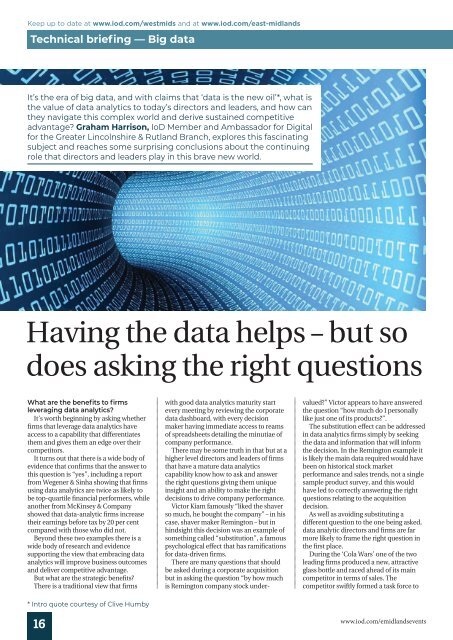IoD Midlands Spring
Institute of Directors, business magazine, director development, business news
Institute of Directors, business magazine, director development, business news
You also want an ePaper? Increase the reach of your titles
YUMPU automatically turns print PDFs into web optimized ePapers that Google loves.
Keep up to date at www.iod.com/westmids and at www.iod.com/east-midlands<br />
Technical briefing — Big data<br />
It’s the era of big data, and with claims that ‘data is the new oil’*, what is<br />
the value of data analytics to today’s directors and leaders, and how can<br />
they navigate this complex world and derive sustained competitive<br />
advantage? Graham Harrison, <strong>IoD</strong> Member and Ambassador for Digital<br />
for the Greater Lincolnshire & Rutland Branch, explores this fascinating<br />
subject and reaches some surprising conclusions about the continuing<br />
role that directors and leaders play in this brave new world.<br />
Having the data helps – but so<br />
does asking the right questions<br />
What are the benefits to firms<br />
leveraging data analytics?<br />
It’s worth beginning by asking whether<br />
firms that leverage data analytics have<br />
access to a capability that differentiates<br />
them and gives them an edge over their<br />
competitors.<br />
It turns out that there is a wide body of<br />
evidence that confirms that the answer to<br />
this question is “yes”, including a report<br />
from Wegener & Sinha showing that firms<br />
using data analytics are twice as likely to<br />
be top-quartile financial performers, while<br />
another from McKinsey & Company<br />
showed that data-analytic firms increase<br />
their earnings before tax by 20 per cent<br />
compared with those who did not.<br />
Beyond these two examples there is a<br />
wide body of research and evidence<br />
supporting the view that embracing data<br />
analytics will improve business outcomes<br />
and deliver competitive advantage.<br />
But what are the strategic benefits?<br />
There is a traditional view that firms<br />
* Intro quote courtesy of Clive Humby<br />
16<br />
with good data analytics maturity start<br />
every meeting by reviewing the corporate<br />
data dashboard, with every decision<br />
maker having immediate access to reams<br />
of spreadsheets detailing the minutiae of<br />
company performance.<br />
There may be some truth in that but at a<br />
higher level directors and leaders of firms<br />
that have a mature data analytics<br />
capability know how to ask and answer<br />
the right questions giving them unique<br />
insight and an ability to make the right<br />
decisions to drive company performance.<br />
Victor Kiam famously “liked the shaver<br />
so much, he bought the company” – in his<br />
case, shaver maker Remington – but in<br />
hindsight this decision was an example of<br />
something called “substitution”, a famous<br />
psychological effect that has ramifications<br />
for data-driven firms.<br />
There are many questions that should<br />
be asked during a corporate acquisition<br />
but in asking the question “by how much<br />
is Remington company stock undervalued?”<br />
Victor appears to have answered<br />
the question “how much do I personally<br />
like just one of its products?”.<br />
The substitution effect can be addressed<br />
in data analytics firms simply by seeking<br />
the data and information that will inform<br />
the decision. In the Remington example it<br />
is likely the main data required would have<br />
been on historical stock market<br />
performance and sales trends, not a single<br />
sample product survey, and this would<br />
have led to correctly answering the right<br />
questions relating to the acquisition<br />
decision.<br />
As well as avoiding substituting a<br />
different question to the one being asked,<br />
data analytic directors and firms are far<br />
more likely to frame the right question in<br />
the first place.<br />
During the ‘Cola Wars’ one of the two<br />
leading firms produced a new, attractive<br />
glass bottle and raced ahead of its main<br />
competitor in terms of sales. The<br />
competitor swiftly formed a task force to<br />
www.iod.com/emidlandsevents

















